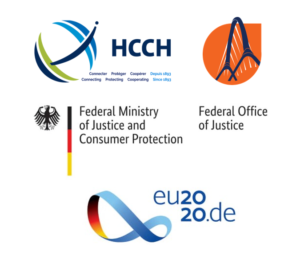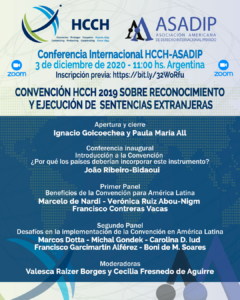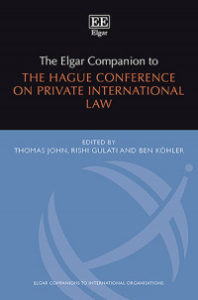This week at The Hague: A few thoughts on the Special Commission on the HCCH Service, Evidence and Access to Justice Conventions
Written by Mayela Celis, Maastricht University [updated on 19 July 2024]
The Special Commission on the practical operation of the 1965 Service, 1970 Evidence and 1980 Access to Justice Conventions will take place in The Hague from 2 to 5 July 2024. For more information (incl. all relevant documents), click here. Particularly worthy of note is that this is the first meeting in the history of the Hague Conference on Private International Law (HCCH) in which Spanish is an official language – the new language policy entered into force on 1 July 2024.
A wide range of documents has been drafted for this Special Commission, such as the usual questionnaires on the practical operation and the summary of responses of Contracting States. These documents are referred to as Preliminary Documents (Prel. Doc.). Particularly interesting is the document relating to Contractual Waiver and the Service Convention (i.e. when the parties opt out of the Convention), the conclusions of which I fully endorse (Prel. Doc. No. 12, click here, p. 10).
Country profiles have also been submitted for approval (Prel. Docs 9 and 10), a practice which is in line with what has been done with other HCCH Conventions. A document on civil and commercial matters has also been issued and while it basically restates previous Conclusions and Recommendations, it includes the suggestion made by some States to develop “a list-based approach to identify the scope of “civil or commercial matters”” and recommends not following that route but rather take a case-by-case approach (Prel. Doc. 11, click here) – a very wise approach.
Moreover, it is worth noting that revised versions of the Service and Evidence Handbooks have been submitted for approval. A track changes version of each has been made available on the website of the Hague Conference. The Handbooks are usually only available for purchase on the HCCH website so this is a unique opportunity to view them (although not in final form).
For ease of reference, I include the links below:
Service Handbook (track version, clean version)
Evidence Handbook (track version, clean version)
With regard to the Service Handbook, a few changes are worth underscoring. I will refer to changes in comparison to the 4th edition of the Handbook. While I will refer to the track changes version, please note that not all changes have been marked as changes as this version refers to changes made to an intermediate version circulated internally:
- P. 61 of the track changes version – Service on an agent – The clarification of the two lines of cases that have emerged regarding service on an agent (e.g. the US Secretary of State) and whether the document should be sent abroad is particularly interesting.
- P. 66 of the track changes version – Service by postal channels on Chinese defendants – The emphasis on China’s opposition to postal channels is particularly significant, given the litigation regarding service on Chinese defendants through postal channels.
- P. 69 et seq. of the track changes version – Substituted service – a welcome addition to underscore that this type of service is also used when the Convention does not apply.
- P. 87 et seq. of the track changes version – a practical example from Brazil on how to locate a person to be served – this is an interesting example and it enriches the Handbook by including an example from Latin America.
- P. 101 et seq of the track changes version and glossary – EU digitalisation – a fleeting reference is made to the modernization initiative of the European Union.
- P. 145 et seq of the track changes version – Water Splash, Inc. v Menon decision by the US Supreme Court – The position of the US regarding article 10(a) has been updated and all the previous case law of lower and appeal courts has been deleted.
The above-mentioned changes are very welcome and will be very useful to practitioners.
On a more critical note, it should be noted that it is unfortunate that the Annex on the use of information technology featured in a previous edition of the Service Handbook has been deleted (previously Annex 8). In this Annex, there were references to the latest case law on electronic service by electronic means (approx. 26 pages), including email (incl. references to the first case and the evolution in this regard), Facebook, X previously known as Twitter, message board, etc. and an analysis whether the Service Convention applied and why (not).
Unfortunately, very few excerpts of this Annex have been included throughout the Handbook. The concept of address under Article 1(2) of the Service Convention vs email address is of great importance and it has remained in its place (p. 88 of the track changes version).
As a result, the Service Handbook contains now very few references to “service by e-mail” (1 hit), “electronic service” (3 hits), “e-service” (2 hits) or “service by electronic means” (10 hits, see in particular, p. 100) and no hits for “service by Facebook” or “service by Twitter”. It also seems to focus on e-service executed by Central Authorities of the requested State according to domestic laws (as opposed to direct service by email across States). And in this regard, see for example the comment from China (Prel. Doc. 15, click here, p. 41).
Having said that, an additional document on IT was drafted (Prel. Doc. No 13, click here), which summarises the way in which information technology can be used to enhance the above-mentioned Hague Conventions and focuses specifically on electronic transmission, electronic service and video-link.
With regard to e-service, Preliminary Document No 13 notes among other things that Contracting Parties remain divided as to whether or not service – of process or otherwise – via e-mail or other forms of e-service is within the scope of Article 10(a) postal channels (p. 9). See in this regard the comment from the European Union (Prel. Doc. 15, click here, p. 38). This casts a shadow on the ‘functional equivalence’ approach of this Convention. Moreover, this document only discusses e-service very briefly and the literature referred to in the Prel. Doc. is outdated pertaining to one or two decades ago. On the other hand, however, reference is made to the 2022 responses to the Questionnaire and two recent cases.
Another perhaps unfortunate deletion is the relationship between the Service Convention and the applicable EU regulation (No. 2020/1784). The Handbook merely dedicates a half page to this important relationship (p. 169 of the track changes version) and does not analyse the similarities and the differences between them, as was the case in previous versions. A missed opportunity.
On a positive note, the graphs and tables have been improved and made more reader-friendly and a new Annex has been included “Joining the Convention” (new States can only accede to the Convention).
With regard to Evidence Handbook, it could be noted that this Handbook has been subject to a more recent update in 2020, as well as the publication of a Guide to Good Practice on Video-Link in the same year. Therefore, in a way there are less new developments to include. In particular, it has been noted that sections of the Guide to Good Practice on Video-Link have been included into the Evidence Handbook. A question may then arise as to whether the Guide will remain a stand-alone document (but apparently, it will not – for now the free version of the GGP can be downloaded. Hopefully, the Handbook will also be translated into as many languages as the Guide was).
As with the Service Handbook, the graphs and tables have been improved and made more reader-friendly.
Of great significance is the delicate split of views with regard to the possibility of obtaining direct taking of evidence by video-link under Chapter I of the Evidence Convention. In my view, this is the Achilles’ heel of the Evidence Convention since without direct taking of evidence under Chapter I, there is a real danger that this instrument has become obsolete. Let alone the fact that the Evidence Convention has no specific safeguards for the direct taking of evidence.
In sum, the Service and Evidence Conventions work well in a paper environment. However, these Conventions are struggling to keep up with technological developments as some States are reluctant to accept the ‘functional equivalence’ approach of some of their provisions, in particular art. 10(a) of the Service Convention and art. 9(2) of the Evidence Convention (direct service by postal channels and direct taking of evidence by the requesting State). An easier implementation of IT is the electronic transmission of requests, something that is left as a long-term goal (see below), the effecting of e-service by the Central Authority of the requested State or the use of video-link in the indirect taking of evidence. A question then arises as to how fit are these Conventions for the future and that is something that only time will tell.
This aside – the updating of the Handbooks and the drafting of the preliminary documents is a huge enterprise. The drafters should be congratulated, as these documents will certainly be of great benefit to the users of both Conventions.
At the end of a meeting of the Special Commission, Conclusions and Recommendations are adopted. In this regard, Prel. Doc. No. 13 submits a few proposals regarding information technology (see pages 15-17). In particular, it stands out [for the long-term] “the proposal for the development of an international system to facilitate the e-transmission of requests or alternatively, to propose how a decentralised system of platforms for the transmission of requests may function effectively.” In that respect, a question arises as to how to combine synergies and avoid overlapping efforts at the international and the EU level.
[Update of 19 July 2024]
The Special Commission (SC) adopted 138 Conclusions & Recommendations (C&R), some of which paraphrase previous C&R – and are identified as such – with some updated text.
Below I include the most relevant C&R with regard to this post. For the full version, click here (also available in French and Spanish, click here).
General Conclusions and Recommendations regarding IT [information technology]
C&R 10-14, see in particular:
13 The SC emphasised that the Conventions operate in an environment which is subject to important technological developments, which have been further stimulated by the COVID-19 pandemic. Although the evolutionary use of IT could not be foreseen at the time of the adoption of the Conventions, the SC reiterated that IT is an integral part of today’s society and its usage is a matter of fact. In this respect, the SC recalled that the spirit and letter of the Conventions do not constitute an obstacle to the usage of IT, and that the application and operation of the Conventions can be further improved by relying on such technology. [See C&R No 4 of the 2003 SC, C&R No 3 of the 2009 SC].
Use of IT – taking evidence by video-link
C&R 46-51, see in particular:
51 The SC acknowledged the different views regarding the use of video-link to take evidence directly under Chapter I [Letters of Request], despite the benefits that it can bring. The SC encouraged Contracting Parties which permit the direct taking of evidence by video-link under Chapter I [Letters of Requests] to provide more information to the PB [Permanent Bureau of the HCCH] about how this occurs in practice so that examples can be summarised and included in the Evidence Handbook and, if required, further information can be developed to inform Contracting Parties on this issue. (Our emphasis as this is precisely the problem highlighted above).
Use of IT (service by digital means – the Service Convention)
73 The SC also recognised that in some domestic legal systems the relevant legal procedures and technological conditions do not allow for service by electronic means, although in certain systems the use of e-mail and online platforms is permitted in certain circumstances, particularly where approved by the judicial authority in advance or there is prior consent by the addressee. [See C&R No 64 of the 2003 SC]. (Our emphasis, same as above).
74 The SC noted that, subject to the domestic law of the requested State, requests for service transmitted under the main channel of transmission (the Central Authority) may be executed by electronic means under Article 5. The SC also noted developments in the use of IT under the alternative channels of Article 10. [See C&R No 37 of the 2014 SC].
Alternative channels of transmission – Service by e-mail
105 The SC noted that Article 10(a) [of the Service Convention] includes transmission and service by e-mail, insofar as such method is provided by the law of the State of origin and permitted under the law of the State of destination. The SC reiterated that service by e-mail under Article 10(a) [of the Service Convention] must meet the requirements established under Article 1 of the [Service] Convention, in particular that the addressee’s physical address in the State of destination is known. The SC noted that e-mail domains are not sufficient for locating the person to be served under Article 10(a). (Our emphasis, as this is particularly complex to determine and prove).
106 The SC reiterated that Contracting Parties may impose other requirements and safeguards regarding the use of e-mail under Article 10(a) [of the Service Convention] and encouraged Contracting Parties to indicate any such requirements in their Country Profiles.
Relationship of the [Service] Convention with other instruments
110 Recalling the relationship of the [Service] Convention with other instruments, the SC recommended greater elaboration in the Service Handbook on such relationship, including with regional and bilateral instruments. The SC encouraged Contracting Parties to provide information about all other instruments that would apply in parallel with the Service Convention in their Country Profiles.
This is in line with what I stated above. See also C&R No 58, which replicates this Conclusion regarding the Evidence Convention
Contractual waivers and the Convention
111 The SC took note of a case reported by one Contracting Party in which the court found that the parties’ agreement to use alternative means of notification constituted a waiver of formal service of process under the applicable law. The SC recalled the Convention’s non-mandatory, but exclusive, character, according to which the [Service] Convention will only apply if the domestic law of the forum determines that there is occasion to transmit a document for service abroad; if so, one of the available channels under the Convention must be used. The SC also stressed the potentially negative impact of such contractual agreements, namely, in relation to the protection of defendants under Articles 15 and 16 of the [Service] Convention, and the recognition and enforcement of judgments in the Contracting Party. The SC further questioned the effect of privately negotiated agreements in light of Contracting Parties’ declarations and reservations. (As suggested by the relevant Preliminary Document).
“Civil or commercial matters” under the Service and Evidence Conventions
125 The SC noted that some Contracting Parties do not regard as “civil or commercial matters” claims in relation to acts of States in the exercise of State authority.
126 The SC recommended that rather than Contracting Parties developing a list-based approach to identify the scope of “civil or commercial matters”, Contracting Parties consider requests on a case-by-case basis, with the aim of providing the broadest possible cross-border judicial cooperation. (As suggested by the relevant Preliminary Document).
Handbooks
131 The SC approved, in-principle, the fifth edition of the Handbooks, while noting that further amendments will be made, including incorporating the discussions at the SC meeting and relevant C&R, in cooperation with the Working Groups. The SC recommended to CGAP to approve the Handbooks.
Future work
137 The SC encouraged Contracting Parties to meet online to further discuss and exchange experiences to develop a deeper understanding of the use of IT and to develop further guidance for e-transmission and associated matters. These discussions will be supported by, or conducted under the auspices of, the PB. Such meetings will be held by way of online workshops for Central Authorities and other users of the Service and Evidence Conventions.



